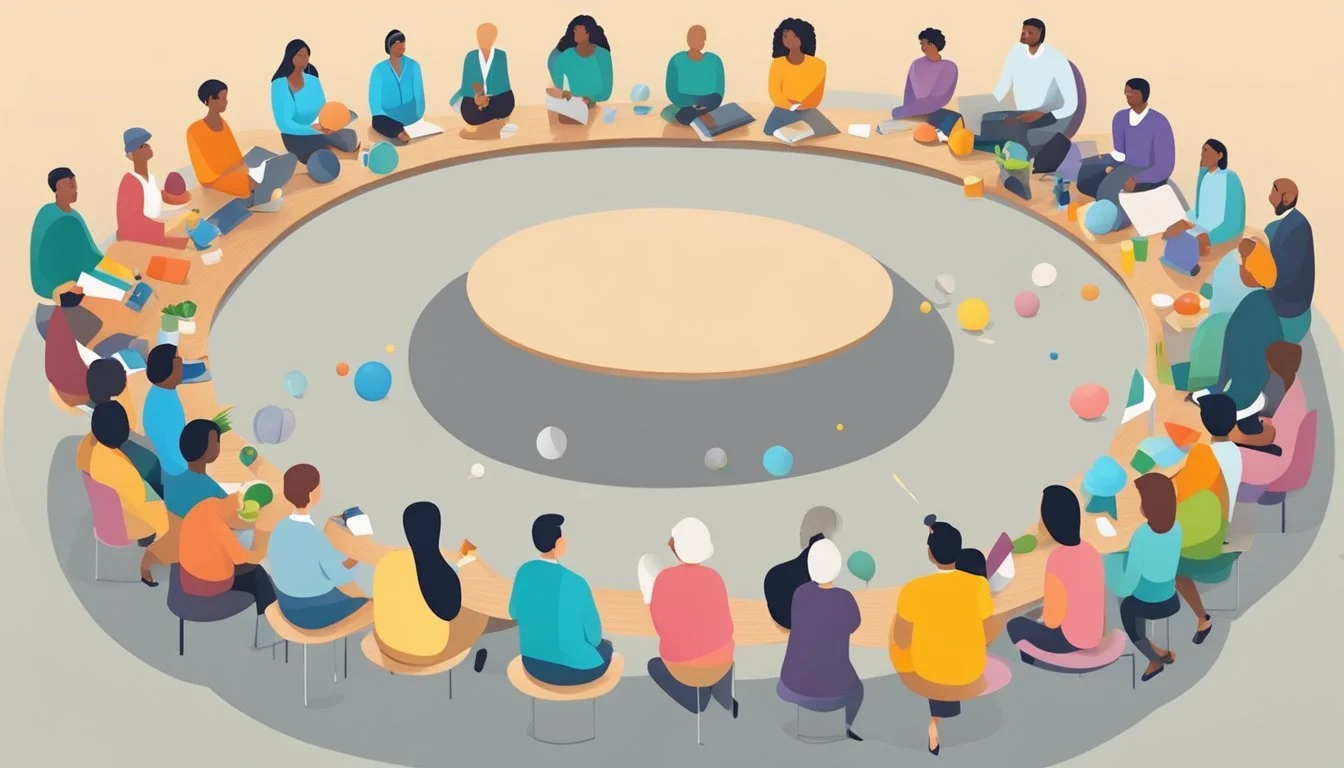10 Secrets to Being an Amazing Listener for Your Friends
Tips for Genuine Connection
Being an amazing listener is an essential skill for maintaining and enhancing friendships. Everyone appreciates someone who can truly hear and understand their feelings and experiences. By being a great listener, one can offer immense value to their friends, fostering deeper connections and trust.
What makes someone stand out as an exceptional listener? It's not just about hearing the words but also about being fully present and engaged in the conversation. There are several techniques and behaviors that can help elevate one’s listening skills, making interactions more meaningful and supportive.
1) Give Full Attention
To be an amazing listener, one must give their full attention to the speaker. This means putting away any potential distractions, such as cell phones, tablets, or computers. Engaging fully in the conversation shows respect and allows for a deeper connection between friends.
Making eye contact is crucial in this process. It signals to the speaker that their message is important and valued. Maintaining eye contact can also enhance understanding through nonverbal communication cues.
Another important aspect is being present in the moment. This involves not letting one’s mind wander or thinking about what to say next. Staying present helps in accurately interpreting the speaker’s words and emotions.
In addition to visual focus, active listening also involves auditory attention. This means truly hearing the words being said, the tone of voice, and the underlying emotions. Focusing on these elements can provide a fuller understanding of the speaker's message.
Watch for body language. Observing the speaker’s gestures and facial expressions can provide additional context and insight into their feelings and thoughts. This nonverbal communication is as important as the spoken word in fully grasping the conversation.
2) Avoid interrupting
Interrupting someone while they are speaking can seem disrespectful and selfish. It's important to stay present and focus on the speaker. Let them share their thoughts completely before you chime in.
One effective technique is to count to ten after the other person stops talking. This brief pause shows you are considering their words carefully. It also gives you time to formulate a thoughtful response.
Explaining to others that you are practicing a delay in responses can help avoid awkwardness. People will appreciate the effort you're making to improve your listening skills. When you focus on listening, you show respect and interest in the conversation.
Another useful tip is to maintain eye contact and use non-verbal cues like nodding. These actions indicate that you are engaged and attentive. They also help prevent the urge to interrupt.
If you find it difficult to avoid interrupting, try repeating the last few words the speaker said before responding. This technique not only ensures you understood them but also gives you a natural pause to organize your thoughts.
Practice active listening to stay engaged. Reflect on what the other person is saying and ask clarifying questions. This approach helps you remain attentive and reduces the temptation to interrupt. For more tips, check out A Conscious Rethink's guide.
3) Show empathy
Showing empathy is essential in being an amazing listener. It helps create a deeper connection with your friends. Empathy involves understanding their feelings and perspectives.
One effective way to show empathy is to practice empathic listening. This technique involves paying full attention and recognizing the emotions behind their words. By actively listening, you ensure your friend feels heard and understood.
Another way to demonstrate empathy is by using affirming statements such as "I can see how that would be hard for you." These statements validate their feelings and show you truly care. Maintaining open body language also communicates empathy.
It's also important to refrain from giving unsolicited advice. Sometimes, friends need someone to listen rather than solve their problems. This approach respects their autonomy and honors their ability to find their own solutions.
Additionally, acknowledging and mirroring your friend's emotions can be powerful. If they're upset, acknowledging their frustration can provide comfort and validation. This technique can be learned through empathic listening resources like those found on BetterUp.
Lastly, practicing empathy regularly helps it become a natural part of your interactions. Over time, your ability to connect deeply with your friends will grow, enriching your relationships.
By integrating these techniques, you can become more empathetic in your listening and strengthen your friendships considerably. For further details on empathic listening, consider exploring resources from Healthline.
4) Ask Open-Ended Questions
Asking open-ended questions is a key skill for becoming an amazing listener. These types of questions encourage friends to share more information and elaborate on their feelings or experiences. Unlike closed-ended questions, which can be answered with a simple "yes" or "no," open-ended questions require more thoughtful responses.
For example, instead of asking, "Did you have a good day?" try asking, "What was the best part of your day?" This invites your friend to share more detailed aspects of their experience.
Open-ended questions also show that you are genuinely interested. They help create a space where your friends feel comfortable expressing themselves.
Another effective question might be, "How did that situation make you feel?" This type of inquiry encourages emotional sharing and helps deepen the conversation.
When your friend is talking about a problem, asking, "What do you think could be a solution?" can help them articulate their thoughts while feeling supported.
If you're discussing future plans, try asking, "What are you looking forward to the most?" This helps your friend reflect on their aspirations and hopes.
For more tips on asking open-ended questions, see the Science of People guide. Engaging with these types of questions can significantly enhance your listening skills.
By incorporating these questions into your conversations, you pave the way for richer, more meaningful interactions. Your friends will appreciate your interest and thoughtful approach.
5) Use non-verbal cues
Using non-verbal cues can significantly enhance listening skills. Nodding the head occasionally signals engagement and agreement. It reassures the speaker they're being heard.
Maintaining eye contact is crucial. It shows interest and helps to build trust. Avoid staring, but regular eye contact creates a connection.
Leaning slightly forward also demonstrates attentiveness. This subtle body language indicates you are fully engaged in the conversation.
Facial expressions play a vital role. Appropriate expressions can indicate understanding and empathy. A smile or a concerned look can go a long way.
Finally, being mindful of body language is key. Keeping an open stance and avoiding crossed arms can create a welcoming environment for open communication.
For further tips on non-verbal listening cues, visit this guide on effective communication. These techniques can transform interactions, making you a better listener.
6) Reflect back what you hear
Reflecting back what you hear is an effective way to show that you are engaged and attentive in a conversation. This involves repeating or paraphrasing what the other person has said.
For example, if a friend mentions they are stressed about work, you could respond with, "It sounds like work has been overwhelming for you lately." This helps confirm that you have understood their feelings.
Reflecting back can also provide an opportunity for clarification. If there’s any misunderstanding, the speaker can correct it immediately. This ensures that both parties are on the same page.
Additionally, this technique encourages the speaker to share more. They feel heard and validated, which can open up further and deeper dialogue. It builds trust and shows empathy.
A simple reflection can be as straightforward as, "You’re saying that you feel unappreciated by your colleagues." Such an approach keeps the conversation going in a positive direction and makes the speaker feel valued.
Using reflective listening regularly can significantly enhance your communication skills and make your friends feel truly understood.
7) Stay present
Staying present is essential for effective listening. This means giving undivided attention to the speaker. Physical presence isn't enough; mental and emotional presence are crucial.
Avoid distractions like phones or background noise. Make eye contact and nod occasionally to show engagement. This helps the speaker feel heard and valued, encouraging them to open up more.
Put aside any thoughts about what to say next. Focus entirely on the speaker’s words. Rehearsing responses can lead to missing key points and emotional cues. Listening attentively captures the complete message.
Body language also matters. Uncross your arms and adopt an open stance to appear approachable and non-judgmental. A mindful, open posture can make a significant impact.
Eliminate judgment and silence inner critics. Embrace mindful listening by putting personal biases aside. This approach builds trust and fosters a deeper connection. Removing judgments also enhances genuine understanding.
Staying present involves continuous practice. Set an intention to be a mindful listener. Put distractions aside and focus solely on the conversation. By silencing unnecessary thoughts, it's easier to connect and understand the speaker’s emotions and ideas more profoundly.
Implement these approaches to ensure that the time spent listening is both meaningful and effective. This investment in the relationship shows respect and meets the friend's emotional needs.
8) Avoid Giving Unsolicited Advice
Listening without interjecting advice shows respect for the speaker's autonomy. Instead of offering solutions, focus on understanding their feelings and perspectives fully.
Unsolicited advice can often feel dismissive to the other person's experience. It suggests that the listener believes they know better, which can lead to feelings of frustration or inadequacy in the speaker.
To truly support a friend, one should practice active listening. This involves empathetic responses and gestures that show genuine interest. Simple actions like nodding, maintaining eye contact, and using affirming words can make the speaker feel heard.
If the urge to advise is strong, consider asking if the speaker wants input. Phrase it respectfully, such as, "Would you like some suggestions?" This question respects their choice and allows them to maintain control over their situation.
Validating their feelings is another critical aspect. By acknowledging what they are experiencing, the listener provides emotional support without overtaking the conversation with their own perspectives.
Being present and patient during these interactions builds trust and opens up more meaningful dialogue. This approach fosters a safe space where friends feel valued and understood without the pressure of unsolicited opinions. For more tips on listening without giving advice, visit Psych Central's guide.
9) Summarize key points
Summarizing key points helps ensure clear communication. It allows both the listener and the speaker to confirm that the message is understood correctly. This technique can be particularly useful in resolving misunderstandings.
When summarizing, focus on the main ideas shared during the conversation. Avoid adding unnecessary details or personal opinions. This keeps the recap concise and precise.
Using phrases like "So, what you're saying is..." can help. It signals to the speaker that you have listened and are processing what they said. This encourages them to clarify or expand on their thoughts if needed.
Summarizing also shows the speaker that their words are valued. It demonstrates active engagement and attention. This can build trust and strengthen your relationship with your friend.
Summaries can be short, just a few sentences. This makes the information easier to digest and remember. Aim to capture the essence of the conversation without overwhelming the speaker with a lengthy recap. This approach can lead to more meaningful and effective communication.
10) Practice Patience
Patience is a crucial component of being an effective listener. When friends share their thoughts, it’s essential to give them the time they need to express themselves fully without interruptions.
Active listening involves maintaining eye contact and nodding occasionally to show understanding. This encourages the speaker and builds a deeper connection.
They should avoid the urge to jump in with advice or solutions immediately. Allowing the conversation to flow naturally helps friends feel heard and valued.
Active listening also means tolerating pauses. Sometimes, friends might need a moment to gather their thoughts before continuing. Each pause is part of the dialogue and should be respected.
Practicing patience can be challenging but rewarding. It allows for a more meaningful exchange and helps solidify trust and respect in relationships.
To improve patience, it’s helpful to focus on the person speaking and clear the mind of distractions. Deep breathing can also help maintain composure during long conversations.
Anyone can cultivate patience with regular practice. Over time, it will become a natural part of their interactions, making them a better listener.
Understanding Active Listening
Active listening is a crucial skill that involves fully engaging with the speaker to understand their message and emotions. It goes beyond passive hearing, focusing on empathy, attention, and reflection.
What Is Active Listening?
Active listening is about more than just hearing words; it's about engaging with and comprehending the speaker's message.
Key aspects include paying full attention, avoiding interruptions, and showing empathy. This can be demonstrated through body language, such as maintaining eye contact and nodding. Reflecting back what the speaker has said also ensures understanding.
Additionally, active listening involves asking open-ended questions to encourage deeper conversation and showing genuine interest in the speaker's perspective.
Benefits of Active Listening
Active listening strengthens relationships and builds trust. When friends feel heard and understood, their connection deepens. It also reduces misunderstandings and conflicts, as accurate comprehension of the speaker's message is prioritized.
This skill can lead to more effective problem-solving, as all parties feel valued and understood. In a support role, active listening allows for better emotional support, leading to increased satisfaction and reduced stress for the speaker.
Overall, active listening improves communication quality, fostering a more meaningful and respectful dialogue.
Developing Empathy in Conversations
Developing empathy in conversations is crucial to becoming an amazing listener for your friends. By understanding the role empathy plays and applying effective techniques, you can build deeper, more meaningful connections.
The Role of Empathy in Communication
Empathy allows individuals to connect on an emotional level. It goes beyond mere hearing. Empathic listening involves understanding and feeling another person’s emotions. This form of communication can enhance relationships and foster trust.
Empathic listening also helps to validate the speaker’s feelings, showing that their emotions matter. This can be achieved through both verbal and nonverbal cues, such as nodding and maintaining appropriate eye contact. Empathy in conversation encourages openness and honesty, allowing friends to feel genuinely heard and understood.
Techniques to Show Empathy
Active listening is a key technique in showing empathy. This involves focusing fully on the speaker, avoiding distractions, and responding appropriately. Simple actions like paraphrasing the speaker's words can demonstrate understanding. For example, you might say, “It sounds like you’re feeling really overwhelmed with work right now.”
Nonverbal communication, such as nodding and maintaining eye contact, also plays a vital role. These gestures convey that you are engaged and care about what the speaker is expressing. Additionally, using affirmations like “I understand” or “That sounds tough” can reinforce empathetic engagement.
Reflecting on emotions expressed and asking open-ended questions can further deepen the empathetic connection. Empathic listening requires practice, but it significantly improves the quality of any conversation.






